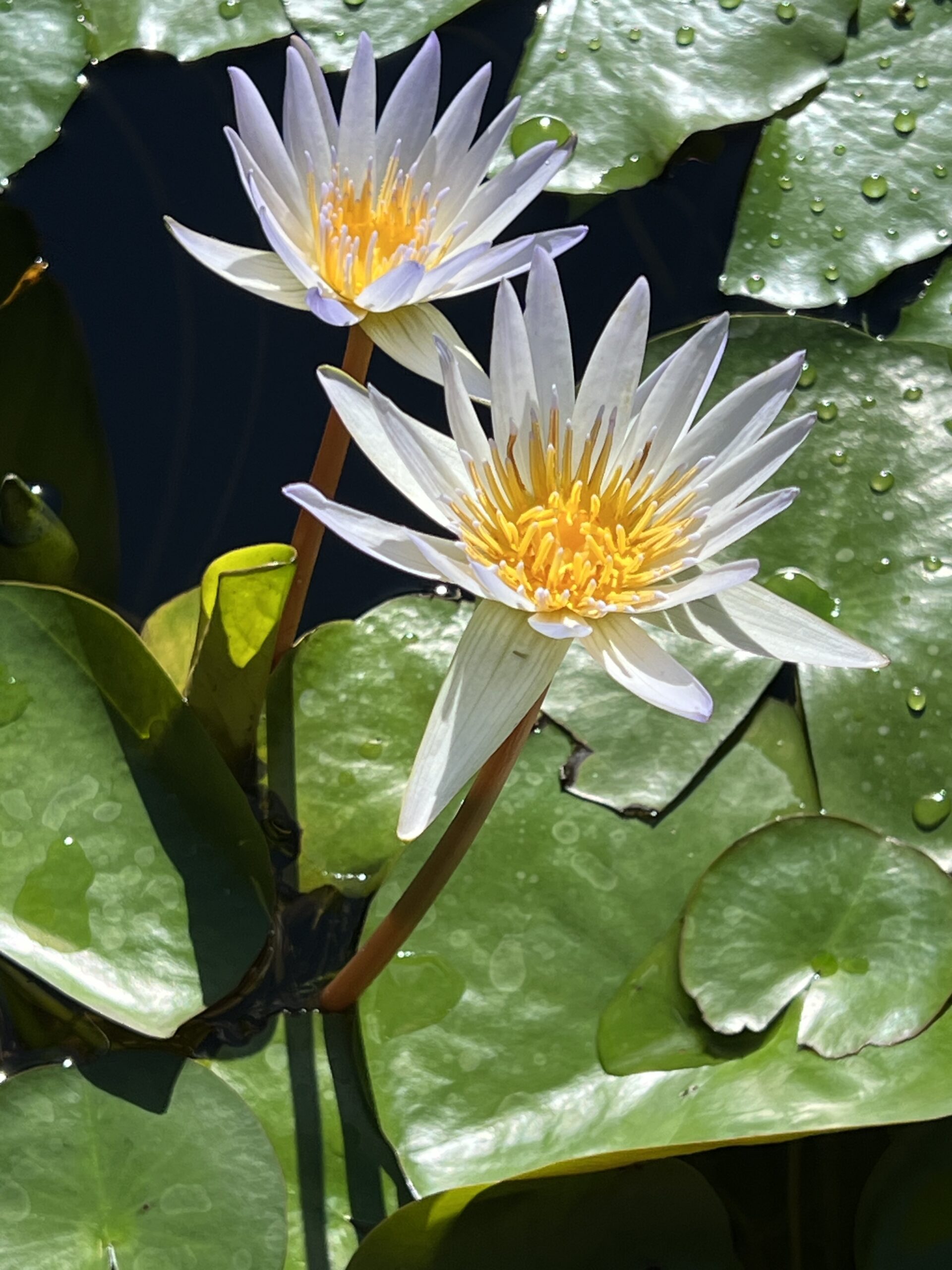May 6, 2024
AIR ROOTS
“Make the present moment, the here and the now, into your true home. That is the only home that we have.”
(Thich Nhat Hanh)
After a four month absence it might take me a minute to get my bearings. One of the first things I notice is the blandness of my surroundings. I wake in a bedroom of beige on beige on beige. And white. This was done intentionally to create a feeling of tranquility. And it works, but it’s a far cry from the colour and vibrancy of the Big Island. And that’s as it should be. Life is nothing if not a sea of contrasts.
There’s a large painting across from me — a broad swath of water with sunlight turning it almost white, and next to that, a small painting of dark clouds towering over a hilltop. I’m reminded of the Sea to Sky Highway that takes us to Whistler. And how all these say something about the contrasts that life’s journey consists of. The highs and the lows; times of peace and joy, and times of struggle and disappointment.
The Daoist’s yin/yang symbol also says something about that, but right now the smell of freshly baked croissants is interrupting my “deep thoughts” and I stir myself to track down this heavenly scent.
I tracked the heavenly scent to a trayful of blackened almonds and am temporarily put out that my dear one didn’t rush off to Thierry to welcome me home with chai tea and pastries this morning. Just as well. It’s too easy to lose my train of thought, this morning’s being a reflection on opposites. And perhaps culture shock.
Swami Vivekananda, one of the first Vedanta philosophers I encountered on my nascent spiritual search, exhorted his followers to maintain the alertness one needs to navigate the city while on retreat in the country, and to bring the peace and tranquility of the country into the noise and haste of the city. A person cannot thrive long in either of these environments exclusively. Ultimately we are challenged to cultivate equanimity to forbear with such extremes.
For me that means getting my city mouse back into action. As I contemplate how to do that I spot the orchid plant sitting on my windowsill. It’s finished blooming, but its waxy deep-green leaves look healthy, and a thick air root meanders out from under the foliage.
I don’t know much about air roots except what the name implies; they are roots that stretch out into the air versus digging underground. What sort of sustenance might the air root be looking for? Something not offered by the soil, obviously. If I think of the soil as my accumulated knowledge and experience, I can see how situations might arise for which I’m just not equipped.
In last week’s blog I cited “asking for help” as one ingredient in a possible recipe for creativity. I think of the game show in which contestants are allowed to phone a friend for help answering a difficult question. Sometimes the friend has the answer, but often not. So, not to contradict my advice to recruit help and expertise when needed, I’m also aware that I can only call upon my fellow humans every so often. It behooves me to mimic the orchid, and dig deeper within while also reaching out to what I call my divine committee. I do this by first recording everything I know about the condition I find myself in. Currently I’m bedridden with a combination of fatigue and allergies, perhaps a cold that is not yet full-blown. A feeling of alienation and apathy pervade my psyche. It might not have helped that I cold-plunged in the ocean yesterday, but what can I do about that today?
What comes to mind is the Buddhist aphorism: “Accept. Distill. Rest.” In the internet equivalent of phoning a friend, I browse the latter aphorism and come up with Thich Nhat Hanh’s teaching: “Rest in the River”, in Lion’s Roar. He writes:
“Resting is a very important practice; we have to learn the art of resting. Resting is the first part of Buddhist meditation. You should allow your body and your mind to rest. Our mind as well as our body needs to rest.
“The problem is that not many of us know how to allow our body and mind to rest. We are always struggling; struggling has become a kind of habit. We cannot resist being active, struggling all the time. We struggle even during our sleep.
“Only if we know how to allow them to rest can our body and our soul heal themselves.”
The message I’m getting is that my body and mind know how to heal if I can just stay rooted in the present, not overthinking what has happened in the recent past, the various projects I tried to wind up before leaving Hawaii, and not running a narrative about what might or might not happen in my absence. Instead, I opt to go for a walking meditation, repeating the mantra Thich Nhat Hanh offers in “Rest in the River”:
“I have arrived. I am home.
In the here. In the now.
I am solid. I am free.
In the ultimate I dwell.”
The point is that a restless mind and body take me away from my inner healing resources. Only by quieting body and mind, like a pebble resting at the bottom of a river, can I awaken my innate healing capacity. By repeating this mantra as I walk I’m steadily bringing myself back into the present, into my center.
And who knows, my walk might just take me by Thierry for that croissant and chai. I’m feeling better already!
